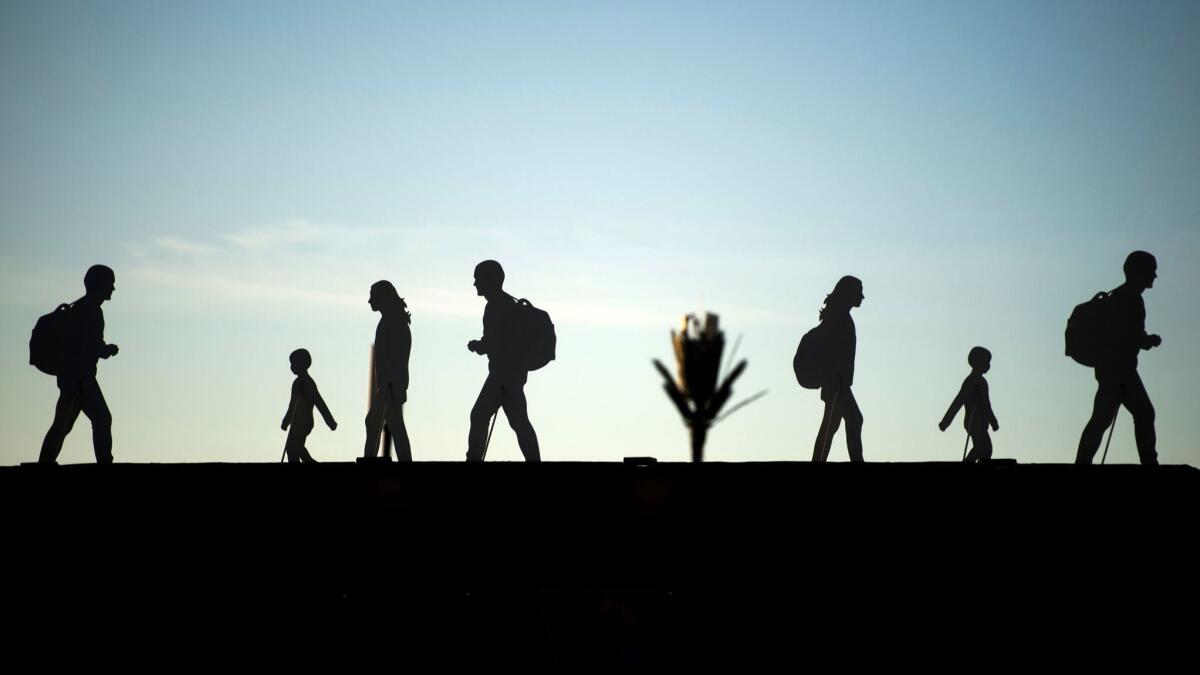Nearly 85% of U.N. states defy U.S. to back migration pact, but the deal gets a bumpy start

- Share via
Reporting from MARRAKECH, Morocco — Defying fierce opposition from the United States and a few other nations, nearly 85% of U.N. member states agreed on a sweeping yet nonbinding accord to ensure safe, orderly and humane migration.
But sparring ensued Tuesday within some signatory countries, with one already threatening to pull out and another seeking to “clarify” its position.
The debate over the Global Compact for Migration, the first of its kind, has proven to be a pivotal test of the United Nations-led effort to crack down on the often dangerous and illegal movements across borders that have turned human smuggling into a worldwide industry, and to give people seeking economic opportunity a chance.
Of the 193 United Nations members, 164 approved the agreement by acclamation Monday during a conference in Marrakech, Morocco. The U.N. General Assembly will meet on Dec. 19 to endorse it.
“Unregulated migration bears a terrible human cost: a cost in lives lost on perilous journeys across deserts, oceans and rivers; and a cost in lives ruined at the hands of smugglers, unscrupulous employers and other predators,” U.N. Secretary-General Antonio Guterres told the migration conference on Monday.
“More than 60,000 migrants have died on the move since the year 2000,” he said. “This is a source of collective shame.”
The compact aims to reduce discrimination toward migrants, reap data about how people move, broaden use of government-backed internet portals to help migrants, and give training and education to migrant women, among other things. It wants detention of migrants to be seen “only as a measure of last resort.”
Government envoys and advocacy groups worked Tuesday to flesh out and refine the migration policy blueprint.
International Organization for Migration Director-General Antonio Vitorino hailed the compact’s approval as a “historic achievement.” Countries must now put the accord to work at the national level, Vitorino said, noting that “no one-size-fits-all” approach works for managing migration.
The accord, in some ways, got off to a bumpy start.
High-level government envoys including German Chancellor Angela Merkel, who attended Monday, have been at pains to dispel what they say is false information circulating about the nonbinding pact — such as claims it would force governments to accept migrants.
And Norwegian State Secretary for Foreign Affairs Marianne Hagen said Tuesday: “Norway will join the Global Compact for Migration, but due to the ambiguity of the text, we find it necessary to clarify our position on certain points.”
One section of the text advises that the “rights and best interests” of children should be protected and respected at all times, including “by working to end the practice of child detention in the context of international migration.”
Hagen said: “Norway’s position is that the detention of foreign nationals may be necessary in some cases, also for minors, but then only as a last resort and for the shortest possible period of time.”
The issue continued to stir tensions elsewhere. Brazil’s incoming foreign minister said late Monday the new government would pull out of the pact, which also prompted sparring in the French Parliament on Tuesday.
One lawmaker from France’s far-right National Rally party denounced backers of the migration compact as “traitors of Marrakech” while another from President Emmanuel Macron’s centrist party decried misinformation on social media implying the pact would force France to take in masses of migrants.
Brazil’s incoming foreign minister, Ernesto Araujo, said Latin America’s biggest country would withdraw from the compact after right-wing President-elect Jair Bolsonaro takes office in January. Araujo tweeted that “immigration cannot be dealt with as a global issue, but according to each country’s reality and sovereignty.”
U.N. leaders hoped to lure back — one day — holdouts that didn’t agree to the accord. They included: Australia, Austria, the Czech Republic, the Dominican Republic, Hungary, Latvia, Poland, Slovakia and the United States, which under President Trump didn’t participate in drafting the accord.
Instead, defections and hesitation emerged as the conference neared. Belgium’s coalition government split in a debate over the pact. Slovakia’s foreign minister announced his resignation after his government opposed the compact, then changed his mind. The government of Switzerland, which co-chaired work on the draft text for months, stayed away as the pressure built.
Madeleine Albright, a former U.S. secretary of State under President Clinton, told a conference panel Monday she was “embarrassed and saddened” the United States wasn’t officially represented at the conference.
The Trump administration — which is demanding a wall on the Mexican border and has sent U.S. troops to the border to block a migrant caravan from Central America — pulled out of the accord a year ago. It claimed that parts of the compact clashed with “U.S. immigration and refugee policies.”
Albright said the accord’s adoption “is all the more notable given the current political climate.”
“Still, even the compact’s strongest supporters will acknowledge that its success ultimately depends on what concrete actions follow,” Albright said.
More to Read
Get the L.A. Times Politics newsletter
Deeply reported insights into legislation, politics and policy from Sacramento, Washington and beyond. In your inbox twice per week.
You may occasionally receive promotional content from the Los Angeles Times.










